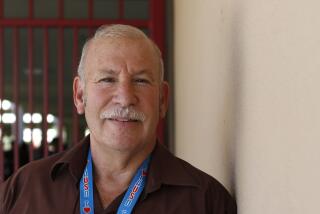L.B. Split on Impact of New School Board Era
LONG BEACH — When voters go to the polls in April to elect new school board members, they will be entering a new era in local educational leadership.
For the first time in its history, the Long Beach Unified School District will be led by board members selected by area rather than in citywide elections.
The likely long-term effects of that arrangement depend on who you talk to. Those who supported Proposition T--which divided the district into five electoral sub-districts after being approved by 60% of the voters in 1986--say it will make elections more democratic, lead to more minority representation and make the board more responsive to neighborhood issues.
Those who opposed it--including most of the current board members--fear it will result in a fragmented board more interested in fighting over parochial interests than in doing what is right for the district as a whole.
One thing is certain: The April 12 election will radically alter the face of the board by removing at least three of its five current members. That will happen because four of the five incumbents live in District 4, comprising the largely affluent east side of the city.
One of them--James Zarifes--has said he will not run. Another--Arlene Solomon--said last week she had not decided whether to take out nomination papers by the deadline Thursday. And the remaining two members--Harriet Williams, who is generally considered a liberal, and John Kashiwabara, generally considered a conservative--say they will slug it out in a race that only one can win. As of last week, no other challengers had entered the District 4 contest.
The fifth incumbent--Elizabeth Wallace--will be running in District 1 in North Long Beach where she will be opposed by several challengers. Races in the three other districts are wide open. Those areas are District 2 on the city’s westside, District 3 downtown and District 4 in Lakewood.
Proponents of Proposition T predicted an outpouring of school board candidates once the process became more local. And indeed, by late last week no fewer than 20 would-be candidates had taken out nomination papers, contrasted with only nine in 1985.
That contrast is less startling, however, when one considers that only two seats were being contested in that race, while all five are up for election this year.
In order to make the transition, those incumbents whose terms would have expired in March of 1987--namely Kashiwabara, Solomon and Williams--had their terms extended by 13 months, while those whose terms were to expire in 1989--Zarifes and Wallace--had theirs reduced.
Thus, this year’s victors in Districts 1, 3 and 5 will serve for two years, while those in Districts 2 and 4 will serve four years. In the future, all board members will serve staggered four-year terms with elections every two years.
A recent action taken by the current board would seem to assure at least some continuity under the group that succeeds it. Last week the board voted to extend by 18 months the contract of Supt. E. Tom Giugni, taking him through June, 1991.
In addition, they slightly sweetened the pot by giving him a 2% salary increase to $92,226 as of July 1, as well as raising his allowance for incidental expenses from $200 to $300 a month.
By extending the superintendent’s contract, Zarifes said, the board synchronized the contract with the district’s fiscal year ending July 1. Although Giugni, who was hired in 1986, is by most accounts a popular administrator, one argument advanced against Proposition T was the inadvisability of saddling such a new superintendent with an inexperienced board that had not chosen him.
Giugni says he is willing to work with any board. Those close to the situation say that such teamwork will be absolutely essential to the solving of the district’s considerable problems in the coming years.
Among those problems: serious overcrowding that last year necessitated the unprecedented decision to begin running several elementary schools year round; large and continuing influxes of minority students for whom English is a second language; spiraling dropout rates; relations with the faculty union that have often been strained; shortages of teachers and supplies; gangs, drugs, teen-age pregnancy and related social problems, and as with most other districts, the ongoing question of school funding.
“I hope we can remain stable,” said Kashiwabara, who has been on the board for five years. “It really depends on who is elected.”
Said Williams: “Long Beach picks pretty good people. I think it’s exciting.”
More to Read
Sign up for Essential California
The most important California stories and recommendations in your inbox every morning.
You may occasionally receive promotional content from the Los Angeles Times.










